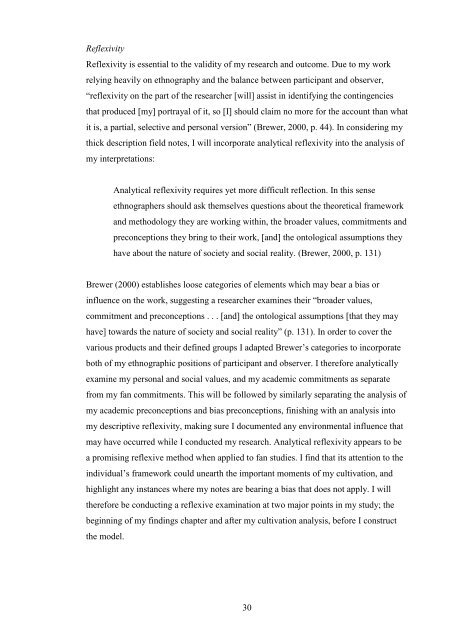The Case Study of Sherlock Holmes (2009) - Scholarly Commons ...
The Case Study of Sherlock Holmes (2009) - Scholarly Commons ...
The Case Study of Sherlock Holmes (2009) - Scholarly Commons ...
Create successful ePaper yourself
Turn your PDF publications into a flip-book with our unique Google optimized e-Paper software.
Reflexivity<br />
Reflexivity is essential to the validity <strong>of</strong> my research and outcome. Due to my work<br />
relying heavily on ethnography and the balance between participant and observer,<br />
“reflexivity on the part <strong>of</strong> the researcher [will] assist in identifying the contingencies<br />
that produced [my] portrayal <strong>of</strong> it, so [I] should claim no more for the account than what<br />
it is, a partial, selective and personal version” (Brewer, 2000, p. 44). In considering my<br />
thick description field notes, I will incorporate analytical reflexivity into the analysis <strong>of</strong><br />
my interpretations:<br />
Analytical reflexivity requires yet more difficult reflection. In this sense<br />
ethnographers should ask themselves questions about the theoretical framework<br />
and methodology they are working within, the broader values, commitments and<br />
preconceptions they bring to their work, [and] the ontological assumptions they<br />
have about the nature <strong>of</strong> society and social reality. (Brewer, 2000, p. 131)<br />
Brewer (2000) establishes loose categories <strong>of</strong> elements which may bear a bias or<br />
influence on the work, suggesting a researcher examines their “broader values,<br />
commitment and preconceptions . . . [and] the ontological assumptions [that they may<br />
have] towards the nature <strong>of</strong> society and social reality” (p. 131). In order to cover the<br />
various products and their defined groups I adapted Brewer‟s categories to incorporate<br />
both <strong>of</strong> my ethnographic positions <strong>of</strong> participant and observer. I therefore analytically<br />
examine my personal and social values, and my academic commitments as separate<br />
from my fan commitments. This will be followed by similarly separating the analysis <strong>of</strong><br />
my academic preconceptions and bias preconceptions, finishing with an analysis into<br />
my descriptive reflexivity, making sure I documented any environmental influence that<br />
may have occurred while I conducted my research. Analytical reflexivity appears to be<br />
a promising reflexive method when applied to fan studies. I find that its attention to the<br />
individual‟s framework could unearth the important moments <strong>of</strong> my cultivation, and<br />
highlight any instances where my notes are bearing a bias that does not apply. I will<br />
therefore be conducting a reflexive examination at two major points in my study; the<br />
beginning <strong>of</strong> my findings chapter and after my cultivation analysis, before I construct<br />
the model.<br />
30

















